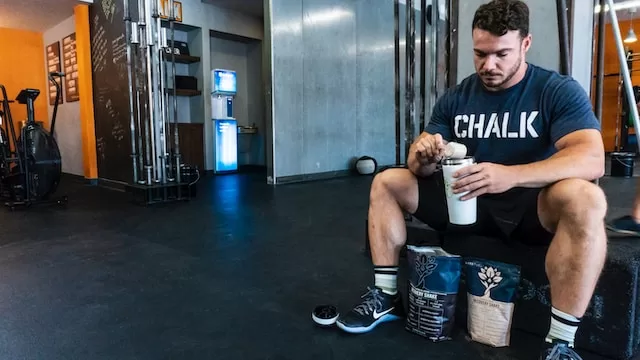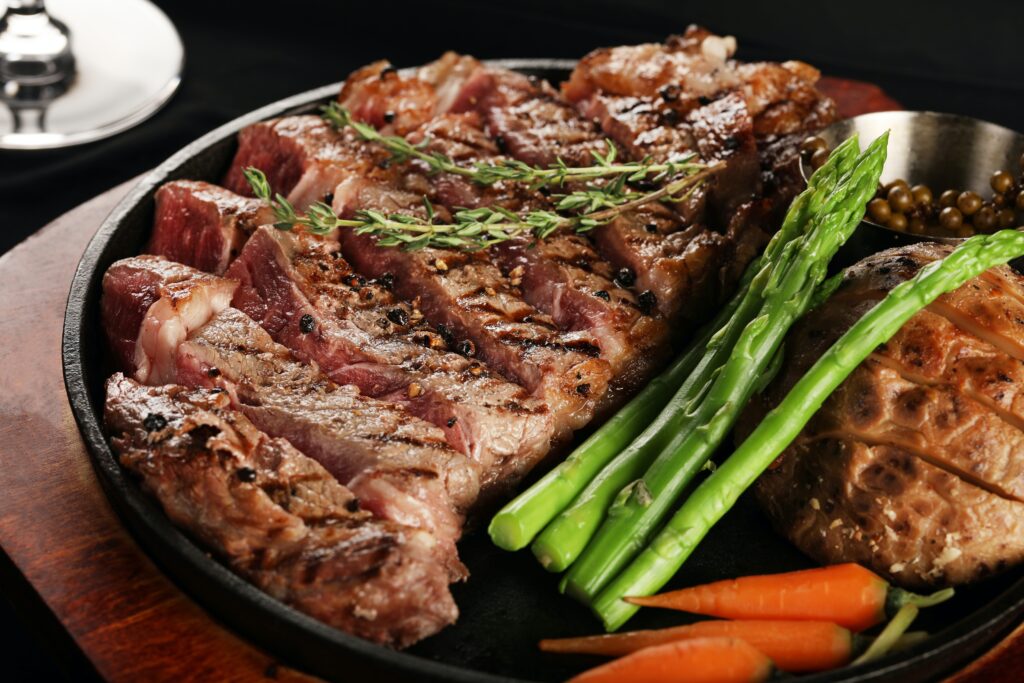CrossFit Nutrition and Recovery: Power Your Performance

As a CrossFit athlete or strength athlete, you know that your workouts are intense and push your body to the limit. But did you know that what you eat after your workout is just as important as what you do during it? Proper post-workout nutrition and food can help aid in recovery, optimize performance, and prevent injury, as well as optimise muscle growth.
To get the most out of your post-workout meal in your CrossFit nutrition and recovery plan, aim for a well-balanced combination of macronutrients including enough carbs, protein, and healthy fats. Nutrient timing is also crucial; consuming a meal within 30 minutes of finishing your training session can help replenish glycogen stores and promote muscle repair.
But it’s not just about what you eat – following a proper CrossFit nutrition and recovery plan and nutrient timing, including a well-timed workout meal, is necessary for weight management and optimal athletic performance, especially for those in the CrossFit community. By fueling your body with the right foods at the right time, you’ll be able to perform at your best both in and out of the gym.
So whether you’re a new or seasoned CrossFitter, understanding the key points of post-workout nutrition can make all the difference in achieving your fitness goals. After all, CrossFit is known for its intense exercise routines that burn a lot of calories and require proper fueling to optimise muscle growth. But before we dive into all that, let’s take a step back: when did CrossFit start? And what exactly is a block?

Understanding the Role of Protein in Muscle Growth and Recovery for CrossFit Athletes
CrossFit athletes, or crossfitters, require a well-balanced diet consisting of nutritious food to support their high-intensity workouts and promote fat loss. One of the essential components of a balanced diet is protein, which plays a crucial role in muscle growth and recovery during intense exercise.
Protein Intake is Crucial for Muscle Growth and Recovery in CrossFit Athletes
Protein is essential for building, repairing, and maintaining muscle mass during intense exercise like CrossFit training. The high-intensity workouts cause stress on muscles, resulting in small tears that require quick repair to prevent injury and promote strength and muscle growth. Protein supplies the necessary amino acids to repair these tears and build new muscle tissue while also supporting fat loss goals. Be sure to take in enough protein to boost your CrossFit performance.
Lean Proteins such as Chicken, Fish, and Beans are Excellent Sources of Protein for CrossFit Athletes
When it comes to CrossFit nutrition and recovery, not all proteins are created equal. As a CrossFit athlete, it’s important to consume lean proteins that provide adequate nutrition without adding unnecessary fat or calories. To optimise muscle growth and have an effective post workout meal, it’s also essential to include carbs in your diet.
Some examples of lean proteins include:
- Chicken breast
- Turkey breast
- Fish (such as salmon or tuna)
- Lean beef
- Eggs
- Greek yogurt
- Cottage cheese
- Beans (such as black beans or lentils)
These foods provide high-quality protein that you should eat for your CrossFit nutrition and recovery. They can help you achieve your muscle growth goals while also supporting overall health and fat loss.
Amino Acids Found in Proteins are the Building Blocks of Muscle Mass
Proteins, essential for post workout muscle recovery and strength building, are made up of amino acids found in various food sources like meat, dairy products, nuts, and legumes. It is crucial to pair protein intake with carbs for optimal CrossFit nutrition and recovery.
Of these 20 amino acids, nine are considered essential because they cannot be produced by the body naturally. It’s crucial to eat these essential amino acids through your post workout diet to support muscle growth and recovery after training. Crossfit nutrition is especially important for ensuring you get the necessary nutrients to fuel your workouts and optimize your results.
Consuming Too Much Protein Can be Detrimental to Muscle Growth and Overall Health
While protein is essential for muscle growth post-workout, eating too much can be detrimental to your health. Excess protein intake after intense exercise can lead to weight gain, dehydration, and even kidney damage due to the high amount of calories.
To optimize muscle growth and recovery post-workout, it’s important to consume the right amount of protein for your body type and activity level. A general guideline is to consume 1 gram of protein per pound of body weight per day, especially after intense exercise when your body needs more calories to repair and build muscle.
Optimising Protein Intake Can Help CrossFit Athletes Achieve their Muscle Growth Goals
Optimising your protein intake after intense exercise and training can help you achieve your muscle growth goals while also supporting overall health by providing the necessary calories.
Benefits of a CrossFit-Specific Diet Plan with Sample Menus
Improved Athletic Performance
Crossfit is a high-intensity workout that requires a lot of energy and intense exercise. Hence, athletes need to fuel their bodies with the right nutrients for optimal performance and to optimise muscle growth. A crossfit-specific diet plan can help improve athletic performance by providing the necessary macronutrients and micronutrients needed for energy, endurance, strength, and to burn calories during training.
Carbohydrates, or carbs, are the primary source of calories for crossfit athletes during training. They provide glucose, which fuels the body and optimises muscle growth. However, not all carbs are created equal; complex carbohydrates like whole grains, fruits, and vegetables provide sustained energy compared to simple sugars like candy or soda.
Protein is also essential in a crossfit diet plan as it helps build and repair muscles after training sessions. Lean protein sources like chicken breast, turkey breast, fish, eggs, and legumes should be included in every meal to provide the necessary calories and carbs needed for optimal performance times.
Healthy fats such as omega-3 fatty acids found in salmon or flaxseed oil can help reduce inflammation caused by intense training. Incorporating the right amount of calories and carbs into your diet, such as through the zone diet, is also important for optimal performance.
Aid in Muscle Recovery
Recovery is an essential part of any training routine. Muscles need time to repair themselves after intense physical activity, and this process can be accelerated by following a nutrition plan that focuses on muscle recovery. Incorporating carbs into your diet multiple times a week can further aid in the recovery process.
One popular diet plan among crossfitters is the zone diet. This eating pattern emphasizes balanced macronutrient ratios: 40% carbohydrates, 30% protein, and 30% fat per meal. By following this ratio consistently throughout the day, athletes can maintain stable blood sugar levels and avoid energy crashes while ensuring adequate nutrient intake for muscle recovery and training. The zone diet is especially beneficial for those who want to optimize their carb intake during training.
Another way to aid muscle recovery after intense training is by consuming anti-inflammatory foods such as berries or leafy greens rich in antioxidants that help reduce inflammation caused by workouts. Additionally, following a zone diet can also support muscle recovery.
Zone Diet
The zone diet, favored by many crossfitters, was developed by Dr. Barry Sears with an emphasis on balanced macronutrient ratios to maintain stable blood sugar levels. This diet plan is ideal for training as it balances the intake of carbohydrates, protein, and fat.
The zone diet recommends dividing meals into blocks based on the individual’s body weight, activity level, and training. One block consists of 9 grams of carbohydrates, 7 grams of protein, and 1.5 grams of fat.
For example, a 150-pound crossfit athlete who follows the Zone Diet and exercises for an hour per day as part of their training may need to consume three blocks per meal or nine blocks per day. This would equate to approximately 27 grams of carbohydrates, 21 grams of protein, and 4.5 grams of fat per meal.
Sample Menus
Following a crossfit-specific diet plan can be challenging without proper guidance or sample menus. However, with the right training and guidance, staying in the zone becomes easier. Here are some examples:
Breakfast
- Omelet with spinach and mushrooms (3 blocks)
- Greek yogurt with berries (2 blocks)
Lunch
- Grilled chicken breast salad with mixed greens and avocado (4 blocks) that is perfect for the zone diet.
- Turkey wrap with lettuce leaves instead of bread (3 blocks) that is perfect for the zone diet.
Dinner
Guidelines for Eating to Aid in Recovery After CrossFit Workouts
CrossFit is a high-intensity workout program that requires a lot of energy and effort. To recover properly from these workouts while maintaining a healthy diet, it’s important to follow certain guidelines such as the zone diet.
General Guidelines for Eating After CrossFit Workouts
There are a few general guidelines you should follow:
- Eat within 30 minutes: It’s important to eat within 30 minutes of finishing your workout, especially if you’re following the Zone diet. This will help your body start the recovery process as soon as possible.
- Eat protein: Protein is essential for muscle recovery and growth, especially if you are following the zone diet. Aim to consume at least 20-30 grams of protein after your workout.
- Replenish glycogen stores: Carbohydrates are essential for replenishing glycogen stores, which provide energy during exercise. If you follow the zone diet, aim to consume 0.5-0.7 grams of carbohydrates per pound of body weight after your workout.
- Stay hydrated: Hydration is crucial for recovery, especially if you’ve been sweating heavily during your workout. If you’re following the zone diet, remember to also drink enough water to maintain proper balance of macronutrients.
- Avoid processed foods: Processed foods can be high in sugar and unhealthy fats, which can hinder the recovery process. Opt for whole, nutrient-dense options instead that are in line with the zone diet principles.
Eating Protein-Rich Foods Aids in Muscle Recovery
Protein is an essential macronutrient that helps repair damaged muscle tissue and aids in muscle growth. Consuming protein-rich foods, especially when following the zone diet, can help speed up the recovery process.
Some examples of protein-rich foods include:
- Chicken breast
- Turkey breast
- Fish (salmon, tuna)
- Lean beef
- Eggs
- Greek yogurt
- Cottage cheese
It’s important to note that not all protein sources are created equal. Animal-based proteins tend to be more complete and contain all the essential amino acids your body needs to repair and build muscle. If you follow the zone diet, it’s important to choose protein sources that fit within your recommended macronutrient ratios.
Carbohydrates Replenish Glycogen Stores for Energy
Carbohydrates are the primary source of energy during exercise, and consuming them after your workout can help replenish glycogen stores in your muscles. This will help ensure that you have enough energy for your next workout while following the zone diet.
Some examples of carbohydrate-rich foods include:
- Sweet potatoes
- Brown rice
- Quinoa
- Oats
- Fruits (bananas, berries)
- Vegetables (broccoli, spinach)
It’s important to choose complex carbohydrates over simple carbohydrates like candy or soda when following the zone diet. Complex carbs provide sustained energy and won’t cause a spike in blood sugar levels, which is crucial for maintaining the principles of the zone diet.
Hydration is Crucial for Recovery
Staying hydrated is crucial for recovery after a CrossFit workout. When you sweat, you lose fluids and electrolytes that need to be replaced. Aim to drink at least 16 ounces of water after your workout, and continue drinking throughout the day to stay hydrated.

Finding the Right Balance: Protein, Carbs, and Fat for Optimal CrossFit Recovery
CrossFit is a high-intensity workout that requires proper nutrition to achieve optimal performance and recovery. Finding the right balance of macronutrients is crucial for CrossFitters who want to maintain their energy levels, build muscle, and reduce body fat.
Enough Carbs are Necessary to Replenish Glycogen Stores and Maintain Blood Sugar Levels
Carbohydrates are essential for fueling workouts and replenishing glycogen stores in muscles. The appropriate carb intake depends on factors such as activity level and how many calories burned during a workout. Generally speaking, CrossFitters should aim to consume 3-5 grams of carbohydrates per pound of body weight per day.
Good sources of carbohydrates include:
- Sweet potatoes
- Brown rice
- Quinoa
- Oatmeal
- Fruits
Healthy Fats Should be Included in the Diet to Support Body Weight and Reduce Body Fat
Many people think that eating fat will make them fat, but this is not true. In fact, healthy fats should be included in the diet to support body weight and reduce body fat.
Good sources of dietary fat include:
- Avocado
- Nuts (almonds, walnuts)
- Seeds (chia seeds, flaxseeds)
- Olive oil
- Coconut oil
The Appropriate Carb Intake Depends on Factors Such as Activity Level and Many Calories Burned During a Workout
The amount of carbohydrates needed varies depending on the individual’s activity level. Those who engage in intense workouts may need more carbs than those who have a more sedentary lifestyle.
In general terms, CrossFitters should aim for 40% carbohydrate intake from their daily calorie consumption. For example, if an athlete needs 2000 calories per day; then they would consume around 200 grams of carbs each day.
How Much Protein Should CrossFitters Eat?
Protein is essential for muscle repair and growth. The recommended daily protein intake varies depending on the individual’s body weight and activity level.
A good rule of thumb for CrossFitters is to aim for 1 gram of protein per pound of body weight per day. For example, if an athlete weighs 150 pounds, they should consume around 150 grams of protein each day.
Good sources of protein include:
- Chicken breast
- Turkey breast
- Fish (salmon, tuna)
- Lean beef
- Cottage cheese
How Much Fat Should CrossFitters Eat?
Fat is an essential nutrient that provides energy and helps with hormone production. The recommended daily fat intake varies depending on the individual’s calorie needs.
In general terms, CrossFitters should aim for 30% fat intake from their daily calorie consumption. For example, if an athlete needs 2000 calories per day; then they would consume around 67 grams of fat each day.
The Importance of Intra-Workout Nutrition Strategies for CrossFit Athletes
Why is Nutrition Important for CrossFitters?
CrossFit athletes require a well-balanced diet to perform at their best. They engage in high-intensity workouts that demand a lot from their bodies, and proper nutrition is essential to optimize performance, prevent injury, and promote recovery. Inadequate nutrition can lead to fatigue, muscle damage, and reduced performance.
Intra-workout nutrition strategies are particularly important for CrossFit athletes as they help avoid the interference effect. This effect occurs when two different metabolic processes occur simultaneously within the body, leading to competition for resources such as energy substrates or enzymes. As a result, one process may interfere with another, leading to suboptimal results.
How Do CrossFit Athletes Train?
CrossFit athletes typically engage in high-intensity interval training (HIIT) that combines weightlifting, gymnastics, and cardiovascular exercises. These workouts are designed to increase strength and endurance while improving overall fitness levels.
However, these intense workouts can also put a lot of strain on the body’s muscles and energy stores. To optimize performance and reduce muscle damage during these workouts, CrossFit athletes need to consume carbohydrates and protein during their training sessions.
Consuming Carbohydrates and Protein During Workouts
Carbohydrates are an essential source of energy for the body during exercise. They provide glucose that fuels muscles during high-intensity activities such as those performed by CrossFit athletes. Consuming carbohydrates during workouts can help maintain blood sugar levels and prevent fatigue.
Protein is also crucial during exercise as it helps repair damaged muscle tissue caused by intense workouts. It also provides amino acids that support muscle growth and recovery.
Consuming carbohydrates and protein together during workouts has been shown to improve performance while reducing muscle damage in CrossFit athletes. A study published in the Journal of Strength & Conditioning Research found that consuming a carbohydrate-protein supplement during a high-intensity workout improved performance and reduced muscle damage compared to a placebo.
Enhancing Recovery and Preventing Fatigue
Proper intra-workout nutrition can also enhance recovery and prevent fatigue in CrossFit athletes. Consuming carbohydrates and protein during exercise can help reduce muscle soreness and promote faster recovery.
Consuming electrolytes such as sodium, potassium, and magnesium during workouts can help replace those lost through sweat. Electrolytes are essential for proper muscle function, and inadequate levels can lead to cramping, fatigue, and decreased performance.
CrossFit athletes should aim to consume 30-60 grams of carbohydrates per hour of exercise along with 10-20 grams of protein. This can be achieved through sports drinks or supplements specifically designed for intra-workout use.
Health & Nutritional Supplements to Support CrossFit Performance and Recovery
CrossFit is a high-intensity workout that requires a lot of energy, strength, and endurance. To perform at your best, you need to ensure that your body has all the nutrients it needs. While whole foods should always be the primary source of nutrients, supplements can provide additional support.
Supplements Can Help Fill in Nutritional Gaps and Support CrossFit Performance
Even with a healthy diet, it’s challenging to get all the nutrients you need from food alone. This is where supplements come in handy. They can help fill in nutritional gaps and support CrossFit performance.
One supplement that can benefit CrossFitters is a multivitamin. A high-quality multivitamin can provide essential vitamins and minerals that may be lacking in your diet. Vitamin D is especially important for bone health and immune function, while magnesium supports muscle relaxation and recovery.
Another useful supplement for CrossFitters is creatine. Creatine helps increase muscle strength and power, which can improve performance during high-intensity workouts such as CrossFit.
Whey Protein Supplements Can Aid in Muscle Recovery and Growth
Whey protein supplements are popular among athletes because they are easily digestible and contain all the essential amino acids needed for muscle recovery and growth.
After an intense workout session like CrossFit, your muscles need protein to repair themselves properly. Whey protein supplements can help speed up this process by providing an easily digestible source of protein.
When choosing a whey protein supplement, look for one with minimal added sugars or artificial ingredients. Opt for natural flavors like vanilla or chocolate instead of artificial flavors like bubblegum or cotton candy.
Fish Oil Supplements Can Reduce Inflammation And Improve Joint Health
Fish oil supplements are rich in omega-3 fatty acids EPA (eicosapentaenoic acid) and DHA (docosahexaenoic acid), which have been shown to reduce inflammation and improve joint health.
CrossFit workouts can be hard on your joints, so taking a fish oil supplement can help reduce inflammation and promote healthy joint function. Omega-3 fatty acids may also help improve heart health and brain function.
When choosing a fish oil supplement, look for one that is high in EPA and DHA. The recommended daily dose is 250-500mg of combined EPA and DHA.
Whole Foods Should Always Be the Primary Source of Nutrients, But Supplements Can Provide Additional Support
While supplements can provide additional support, it’s important to remember that whole foods should always be the primary source of nutrients. A balanced diet rich in fruits, vegetables, lean proteins, and healthy fats is essential for overall health and wellness.
Supplements should be used to fill in nutritional gaps or support specific needs. For example, if you’re not getting enough vitamin D from food alone or have a known deficiency, a vitamin D supplement may be beneficial.
It’s also important to speak with a healthcare provider before starting any new supplements to ensure they are safe for you to take.
Achieving Optimal Performance with Crossfit Nutrition and Recovery
To maximize your performance in CrossFit, it’s essential to prioritize proper nutrition and recovery. Protein plays a crucial role in muscle growth and recovery for CrossFit athletes, while a CrossFit-specific diet plan can provide numerous benefits. Eating to aid in recovery after workouts requires finding the right balance of protein, carbs, and fat.
Intra-workout nutrition strategies are also important for optimal performance and recovery. Health and nutritional supplements can support your efforts as well. By following these guidelines and incorporating them into your routine, you can achieve your best results yet in CrossFit.
Call-to-action: Start implementing these nutrition and recovery strategies today to take your CrossFit performance to the next level.
FAQs:
Q1: What should I eat before a CrossFit workout?
A: It’s essential to fuel up with carbohydrates before a workout to ensure you have enough energy. Try eating foods like oatmeal or sweet potatoes about an hour before exercising.
Q2: How much protein do I need as a CrossFit athlete?
A: The amount of protein you need depends on factors such as body weight, activity level, and training goals. As a general rule of thumb, aim for at least 0.7-1 gram of protein per pound of body weight per day.
Q3: Can I still enjoy my favorite foods while following a CrossFit-specific diet plan?
A: Absolutely! While it’s important to prioritize nutrient-dense foods that support your athletic goals, there is still room for flexibility within a balanced diet.
Q4: Are there any specific supplements that can help specificallt with CrossFit nutrition and recovery after a tough workout?
A: Supplements such as BCAAs (branched-chain amino acids), creatine, and fish oil can all be useful for supporting muscle growth and aiding in post-workout recovery.
Q5: Do I need to eat immediately after a workout?
A: While it’s not necessarily essential to eat right away, consuming a meal or snack within 30 minutes to an hour after exercising can help jumpstart the recovery process and replenish your energy stores.

Dave Carter
Dave serves as the head writer and chief content curator for CrossFitopedia.com, the premier destination for CrossFit enthusiasts seeking to enhance their fitness journeys.

